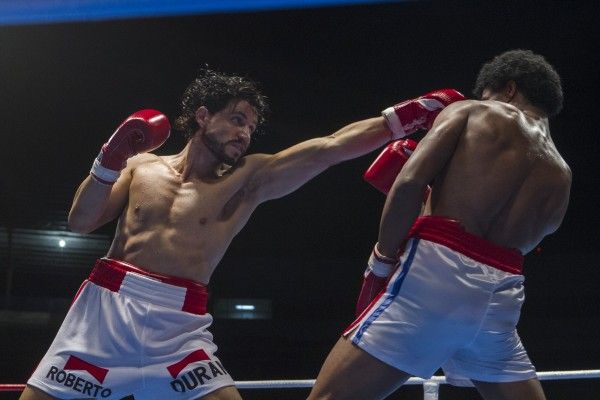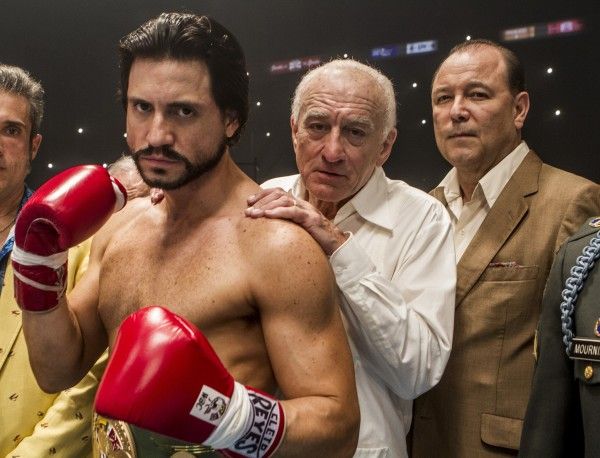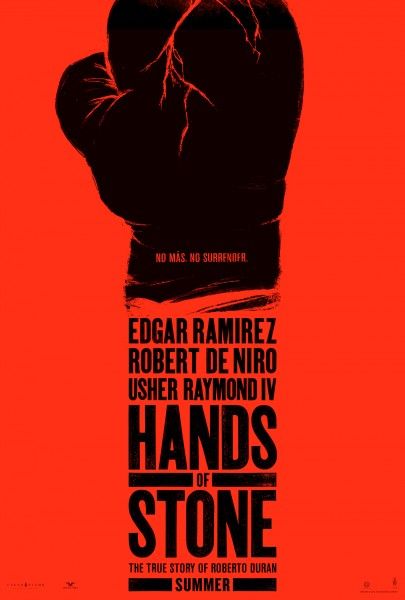The fact that Jonathan Jakubowicz made a biopic ostensibly about Panamanian boxer Roberto Durán and yet made the narrator of the film Durán’s American trainer Ray Arcel should tell you everything you need to know about Hands of Stone. Jakubowicz takes a scattershot approach to his subject, dancing all around the ring but never landing a punch. It’s a friendship story that never delves into the friendship; it lazily follows the rise-fall-redemption beats of a standard biopic; and it misses its strongest aspect—telling a Panamanian story—in favor of a predictable, limp narrative. Despite a strong performance from Edgar Ramírez, Hands of Stone would be better off throwing in the towel.
The story charts the career of Panamian boxer Roberto Durán (Ramírez) and his partnership with trainer Ray Arcel (Robert De Niro) as they work to take the world championship from Sugar Ray Leonard (Usher Raymond IV). We also see Durán’s relationship with his future wife Felicidad Iglesias (Ana de Armas) and his anger at the American occupation of Panama. And because the film feels like this somehow isn’t enough story for the film, they also lump in Arcel’s backstory as well even though it adds nothing to the overall picture.
Jakubowicz has made a horribly inept picture that has no idea how to pursue its subject. The cradle-to-the-grave biopic is a dead structure, and while Hands of Stone doesn’t follow Durán’s post-boxing life, it does get stuck in a predictable pattern of rise-fall-redemption. To the film’s credit, it does try to make Durán a unique figure by refusing to paint him as a saint, and even in his “rise”, the portion where most stories make their protagonist out to be perfect, he’s kind of an asshole. He has a huge chip on his shoulder, and he’s not a particularly likable character. However, that backfires when it comes time for his fall because we can see that Durán’s greatest enemy is himself even when the film tries to pin the blame on greedy promoters that rushed him to a rematch with Leonard.
Ramírez’ brings depth and complexity to a character the film would prefer to see as simplistic. Everything that’s likable and endearing about Durán comes from Ramírez’ childlike performance. And it’s “childlike” in the full sense of the word. He’s both immature and yet lovable, although during the “fall” section of the movie, he becomes too selfish and too boorish to tolerate, but it feels like the film has pushed the character in this predictable direction rather than coming at his personality honestly. We know exactly where Hands of Stone is going to step, so it never lands a hit.
At times it seems like Jakubowicz is working from an earlier draft where he really invested in telling the story of Durán and Arcel’s friendship, but we never see him invest in that relationship. There are a few scenes where they have a nice chat together, but they seem more like colleagues than anything else. There’s no scene where Arcel comes to dinner, or they make themselves present in each other’s personal lives. At best, I could believe that these men mutually respected each other, but nowhere near the point to where Arcel should be the narrator of Durán’s story. To put it another way, if someone were going to tell the story of your life, would you rather it came from a friend or a co-worker?
The movie also fails in the one place where you would expect a boxing movie to succeed—the boxing scenes. Jakubowicz shows he has no idea how to shoot boxing, and just throws everything at the screen. The camera swoops around the arena. It gets in close for the hits. It moves around seemingly at random, and it makes you appreciate how much artistry went into a film like Creed where director Ryan Coogler understood how to build tension and that viewers wanted to be drawn into the action rather than just be assaulted by a bunch of flashy camera tricks.
On the one hand, I’m glad someone wanted to tell the story of Roberto Durán and attempt to tell the difficult history of U.S.-Panama relations along with it. But Hands of Stone fails to connect time and again because it has no idea how to properly tell its story. It fast-forwards where it should slow down and focus, and it blithely goes through the biopic beats we’ve seen time and again. Watching Hands of Stone, you’ll echo the statement Durán reportedly made during his second fight with Leonard: “No mas.”
Rating: D




